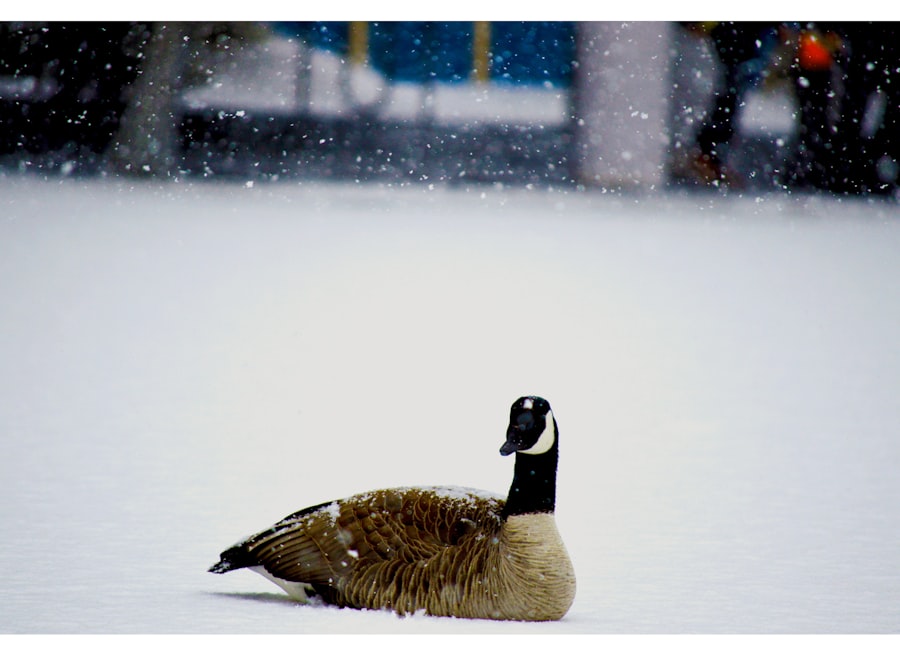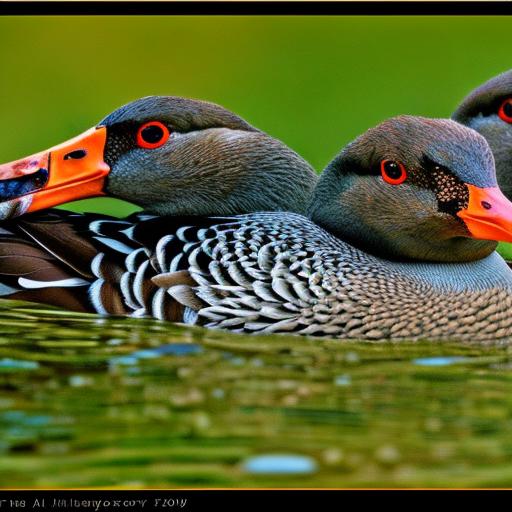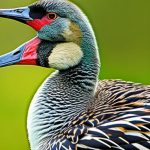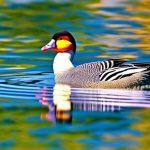Geese invading yards and causing damage is a common problem that many homeowners face. These large birds can be a nuisance, leaving behind droppings, damaging lawns, and even becoming aggressive towards humans and pets. Fortunately, there are several methods that can be used to deter geese and prevent them from entering your yard. In this article, we will explore different strategies for keeping geese at bay and maintaining a goose-free environment.
Key Takeaways
- Geese are social animals and tend to stay in groups, so scaring one away may not be effective in deterring the entire flock.
- Physical barriers such as fences or netting can prevent geese from entering your yard, but they must be properly installed and maintained.
- Decoys such as fake predators or other animals can be effective in scaring geese away, but they must be moved regularly to avoid habituation.
- Sound deterrents such as loud noises or predator calls can be effective in keeping geese at bay, but they may also disturb neighbors.
- Natural repellents such as citrus sprays or predator urine can discourage geese from entering your yard, but they must be reapplied regularly.
Understanding the behavior of geese
To effectively deter geese, it is important to understand their behavior and what attracts them to certain areas. Geese are attracted to areas with ample food sources, open spaces for nesting, and bodies of water for swimming and drinking. They are social animals that communicate with each other through honking and body language. By observing geese from a distance, you can learn more about their behavior and how they interact with their surroundings.
Creating physical barriers to prevent geese entry
One effective method for deterring geese is to create physical barriers that prevent them from entering your yard. There are several types of barriers that can be used, including fences, netting, and hedges. Fences should be at least three feet high to prevent geese from jumping over them. Netting can be installed over ponds or other bodies of water to prevent geese from swimming in them. Hedges can also be used to create a barrier between your yard and open spaces where geese may gather.
Using decoys to scare geese away
Another method for deterring geese is to use decoys that mimic the appearance of predators. Geese are naturally wary of predators such as coyotes or owls, so placing decoys in your yard can help scare them away. There are different types of decoys available, including stationary decoys and motion-activated decoys that move or make noise when geese approach. It is important to regularly move the decoys around to prevent geese from becoming accustomed to their presence.
Implementing sound deterrents to keep geese at bay
Sound deterrents can also be effective in deterring geese from entering your yard. These devices emit loud noises or predator calls that scare geese away. There are different types of sound deterrents available, including motion-activated devices and ultrasonic devices that emit high-frequency sounds that are unpleasant to geese. It is important to place the sound deterrents strategically around your yard to cover a wide area and discourage geese from approaching.
Using natural repellents to discourage geese from entering your yard

Natural repellents can be used to create an unpleasant environment for geese and discourage them from entering your yard. There are several types of natural repellents that can be used, including citrus sprays, garlic sprays, and predator urine. These repellents can be sprayed on grass, plants, or other areas where geese may gather. It is important to reapply the repellents regularly, especially after rain or watering, to maintain their effectiveness.
Removing food sources that attract geese to your yard
Geese are attracted to areas with abundant food sources, so removing these food sources from your yard can help deter them. Geese are particularly fond of grass, so keeping your lawn short and well-maintained can make it less attractive to them. It is also important to remove fallen fruits or berries from trees and bushes, as these can be a food source for geese. Additionally, avoid feeding birds or other animals in your yard, as this can attract geese as well.
Installing motion-activated sprinklers to deter geese
Motion-activated sprinklers can be an effective deterrent for geese, as they are startled by sudden bursts of water. These sprinklers can be installed in areas where geese are likely to gather, such as near ponds or open spaces. When geese approach, the motion sensor will detect their movement and activate the sprinklers, scaring them away. It is important to adjust the sensitivity of the motion sensor to prevent false activations, such as from small animals or falling leaves.
Creating an unattractive environment for geese to inhabit
Making your yard unattractive to geese can help deter them from entering and nesting. Geese prefer open spaces with easy access to water, so planting dense shrubs or tall grasses can make your yard less appealing to them. Additionally, removing any structures or objects that provide shelter or nesting sites for geese can discourage them from staying in your yard. Regularly inspect your yard for any potential nesting sites and take steps to remove or block them.
Regularly maintaining your yard to prevent geese from nesting
Regular yard maintenance is crucial for preventing geese from nesting in your yard. Geese prefer to nest in areas with tall grasses or shrubs, so keeping your lawn well-maintained and free of debris can discourage them from nesting. It is also important to regularly remove any goose droppings from your yard, as the presence of droppings can attract more geese. By maintaining a clean and well-kept yard, you can make it less inviting for geese to nest.
Seeking professional help to handle persistent geese problems
In some cases, professional help may be necessary to handle persistent geese problems. If you have tried various deterrent methods without success, it may be time to consult with a professional wildlife control company. These professionals have experience in dealing with geese and can provide effective solutions tailored to your specific situation. When hiring a professional, be sure to research their qualifications and ask for references from previous clients.
In conclusion, there are several methods that can be used to deter geese from invading your yard and causing damage. By understanding the behavior of geese and implementing various deterrent strategies, you can create an environment that is unattractive to geese and prevent them from entering your yard. Whether it is creating physical barriers, using decoys and sound deterrents, or implementing natural repellents, taking action to deter geese is essential for maintaining a goose-free environment.
If you’re looking for effective ways to keep geese out of your yard, you might also be interested in learning about the importance of providing a coop for turkeys. Poultry Wizard has an informative article on whether turkeys need a coop, which can offer valuable insights into creating a safe and secure space for these birds. Understanding the principles behind coop placement and design can not only help keep your turkeys protected but also contribute to maintaining a goose-free yard. To learn more about this topic, check out the article here.
FAQs
What are some common problems caused by geese in yards?
Geese can cause damage to lawns, gardens, and landscaping by eating plants and leaving droppings. They can also be aggressive towards humans and pets.
What are some natural ways to keep geese out of your yard?
Planting tall grasses or shrubs around the perimeter of your yard can deter geese from entering. You can also use decoys of natural predators, such as coyotes or owls, to scare them away.
What are some non-natural ways to keep geese out of your yard?
Installing physical barriers such as fences or netting can prevent geese from entering your yard. You can also use noise deterrents such as ultrasonic devices or loudspeakers playing predator calls.
Is it legal to harm or kill geese to keep them out of your yard?
No, it is illegal to harm or kill geese without a permit. There are humane ways to deter geese from your yard without causing harm to them.
What should I do if I encounter an aggressive goose?
It is best to slowly back away from the goose and avoid making direct eye contact. Do not run or turn your back on the goose, as this can provoke it further. If the goose continues to be aggressive, seek help from a professional wildlife control service.
Meet Walter, the feathered-friend fanatic of Florida! Nestled in the sunshine state, Walter struts through life with his feathered companions, clucking his way to happiness. With a coop that’s fancier than a five-star hotel, he’s the Don Juan of the chicken world. When he’s not teaching his hens to do the cha-cha, you’ll find him in a heated debate with his prized rooster, Sir Clucks-a-Lot. Walter’s poultry passion is no yolk; he’s the sunny-side-up guy you never knew you needed in your flock of friends!







